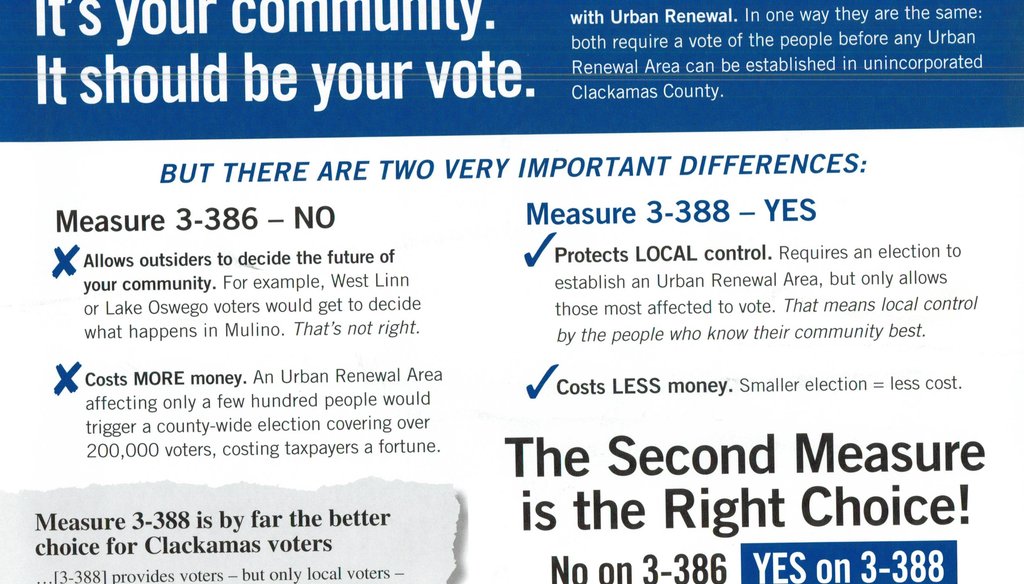

Our only agenda is to publish the truth so you can be an informed participant in democracy.
We need your help.


First of two
Voters love to save money. They also probably don’t want to spend "a fortune" on unnecessary elections. These are precisely the points being made by supporters of a Clackamas County board-backed measure on the Nov. 8 ballot.
A campaign mailer in favor of Measure 3-388 urges voters to say no to county Measure 3-386, a competing proposal that would require a county-wide vote on future urban renewal project areas.
"There are two measures on the ballot having to do with Urban Renewal. In one way they are the same: both require a vote of the people before any Urban Renewal Area can be established in unincorporated Clackamas County. But there are two very important differences:"
The mailer says that 3-386 "Costs MORE money. An Urban Renewal Area affecting only a few hundred people would trigger a county-wide election covering over 200,000 voters, costing taxpayers a fortune."
The mailer also urges a yes vote on Measure 3-388, which would require approval from a smaller number of voters who live in a proposed urban renewal district. This is the proposal backed by the Clackamas County Board of County Commissioners. The mailer says this measure "Costs LESS money. Smaller election = less cost."
You guessed our burning question: Does the county-wide measure cost "a fortune" while smaller elections cost less? (A similar mailer went out just this week.)
Measure 3-386 was put on the ballot by citizen petitioners who don’t like the county board approving new urban renewal areas without a county vote. If this measure passes, any new plan or substantial change to an existing plan would need to be approved by a majority of county voters in a primary or general election. In other words, commissioners would have two opportunities every two years.
The competing measure put forth by the county board, Measure 3-388, would send the issue only to voters who live in a proposed or existing district. So there would be fewer voters voting, but this election could happen during one of four authorized elections a year. That’s eight opportunities every two years.
At first blush, it sounds as if a countywide election would be just as cost effective. After all, how much could it cost to add a question to a general or primary election ballot that needs to go out anyway so people can vote on federal and state offices?
County elections manager Steve Kindred says that an urban renewal question on a general election ballot wouldn’t cost more if it goes to more voters. The ballots would be the same size whether the question goes to 200,000 voters or 1,000 voters. The Voters’ Pamphlet is not zoned. Turnout would be high anyway in a general election so the issue probably wouldn’t boost processing costs.
On the other hand, an off-year election strictly for an urban renewal question, no matter how small the voting pool, could cost an extra $10,000.
We contacted Ann Lininger, a Clackamas County commissioner serving as one of the point people on the more limited proposal. She said the county-wide measure would cost more because it would require more notice and explanation to more voters who live in disparate parts of the county.
There is a requirement in the county-wide measure that the county send notice to voters before an election. The notice must explain that there is an urban renewal measure on the ballot; that it would take away from other public services for x number of years; that the maximum amount of indebtedness would be x dollars; and that the maximum amount of interest would be x amount.
The measure allows the county to include that information in the 500-word explanatory statement required by state law. But Lininger said that option is not feasible, given the complexity of a development plan and the need to make sure voters understand the issue. So the county would have to spend at least $45,000 on mailers, she said, and more on staff time for public meetings.
"You would want to have the opportunity to make a case in the explanatory statement," she said.
But Beaverton officials had no problem including that same information in their Voters’ Pamphlet statement for Measure 34-192, which proposes a new urban renewal area. Eric Winters, the attorney who drafted the citizen-approved measure in Clackamas County, said the Beaverton explanatory statement pretty much meets his test. And there was room to explain the plan.
Measure 3-386 may very well cost more than 3-388 in the end, if you factor in all the time and resources commissioners and staff would need to promote an urban renewal measure or make a significant change to one. But that’s campaigning, not just providing basic information or holding an election.
The statement in the mailer zeroes in on election costs. We find that the proponents of the smaller election option have not proved their case that their version would cost less or that a countywide election would cost a fortune. In fact, special elections could cost more.
The statement is not accurate. We rate it False.
Interview with Steve Kindred, Clackamas County elections manager, Oct. 26, Nov. 1, 2011
Interview with John Lee, chairman Clackamas County Republicans, Oct. 26, 2011
Emails from and interview with Eric Winters, Oct. 26-27, 31, 2011
Emails from Ann Lininger, Oct. 25, Nov. 1, 2011
Interview with Ann Lininger, Oct. 31, Nov. 1, 2011
City of West Linn, Oct. 31, 2011
Washington County Nov. 8, 2011 Voters’ Pamphlet
Clackamas County Nov. 8, 2011 Voters’ Pamphlet
In a world of wild talk and fake news, help us stand up for the facts.
